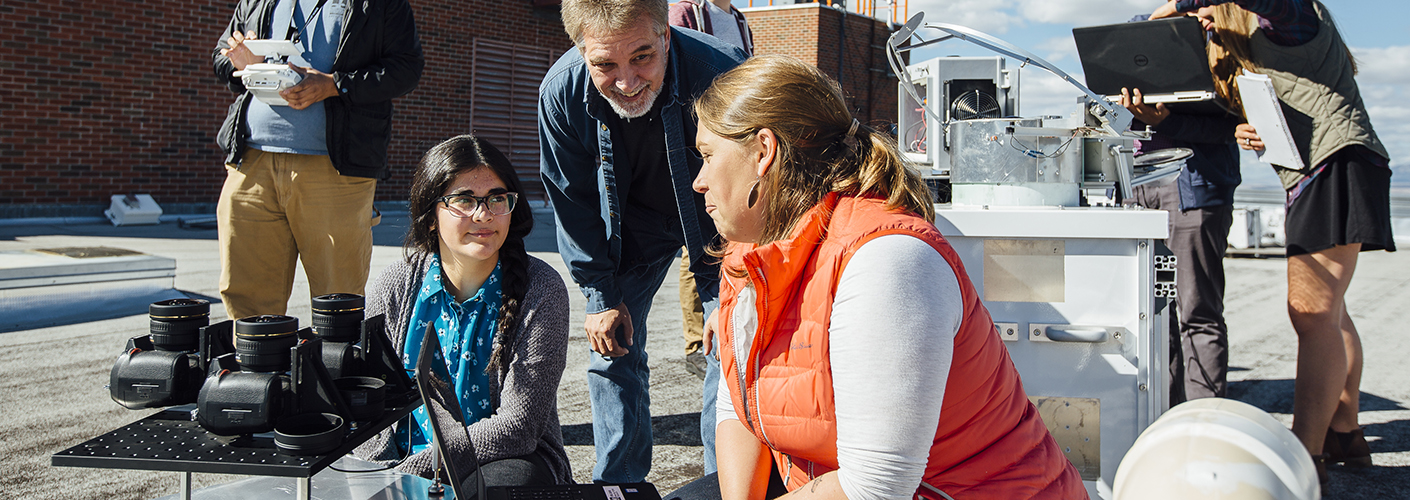test
Conduct innovative research projects alongside world-class scholars in subject areas such as nanofabrication, optics and remote sensing, digital design and intelligent computing.
Electrical Engineering – Master of Science (M.S.) and Doctor of Philosophy (Ph.D.)
In the Electrical Engineering department at Montana State, graduate students are granted access to innovative research labs and centers that allow candidates to explore cutting-edge issues in the field. With a variety of degree paths that include a Master of Science and Ph.D. options, graduate candidates are able to further their studies in a variety of ways. Associated research entities include the Spectrum Lab, the Montana Nanotechnology Facility (MONT) and the Optical Technology Center (OpTeC), among others. While candidates are further honing their skills with vital hands-on learning opportunities, they are also supported by award-winning faculty who are recognized leaders in their area of expertise.

Carnegie Classified
The prestigious Carnegie Classification of Institutions of Higher Education® ranks
Montana State University among the Top 5 public, 4-year universities for Very High
Research Activity with a STEM-dominant research doctoral program.

WICHE Partnered Program
This graduate program honors the WICHE partnership for students from 15 western states. If you’re a resident of a WICHE state, you qualify for tuition significantly less
than standard non-resident tuition. Learn more.
* M.Eng Progam Only

Freedom to Explore
With more than a dozen faculty members with a broad yet complimentary expertise in subjectsranging from optics to intelligent computing to nanofabrication,the Electrical Engineeringprogramoffersstudents the opportunity to conduct highly collaborative, interdisciplinary research.
Fund Your Education
The Graduate School at Montana State is dedicated to helping students secure funding during their time at MSU. Some resources the Electrical Engineering department and Graduate School offer includes:
- The Benjamin Fellowship, given to three new Ph.D. students in the Norm Asbjornson College of Engineering
- Internal Fellowship and Funding Opportunities
- External Fellowship and Funding Opportunities
Additionally, most of our incoming graduate students are funded with teaching assistantships for at least their first year. During that period, they connect with faculty and typically receive research assistantships for the remainder of their graduate studies. Applicants must be admitted before being considered for funding.
Facilities
Research in the Electrical & Computer Engineering department is interdisciplinary in nature but works heavily with the following research entities:
- Montana Nanotechnology Facility
- Optical Technology Center
- Spectrum Lab

Careers after Graduation
Graduate alumni in Electrical Engineering embark on a wide range of careers within 10-years of their graduation.
Nearly 57% are working in for-profit, 21% in academia, and about 7.1% for government. Top industry employers include Apple INC and Argo AI.
Across all career paths the estimated salary of alumni within 10 years of graduation ranges from $60,000 to $150,000 with an average of $95,000 (source of data Academic Analytics).
Admissions Requirements
Note: no GRE Required.
Each program within the Graduate School at Montana State has its own particular requirements for admission, and the Electrical Engineering program is no different. To ensure that you start your application on the right foot, please review the admissions requirements for the Electrical Engineering program. This includes any additional deadlines that the Norm Asbjornson College of Engineering may have aside from the Graduate School, which does practice rolling admissions.

